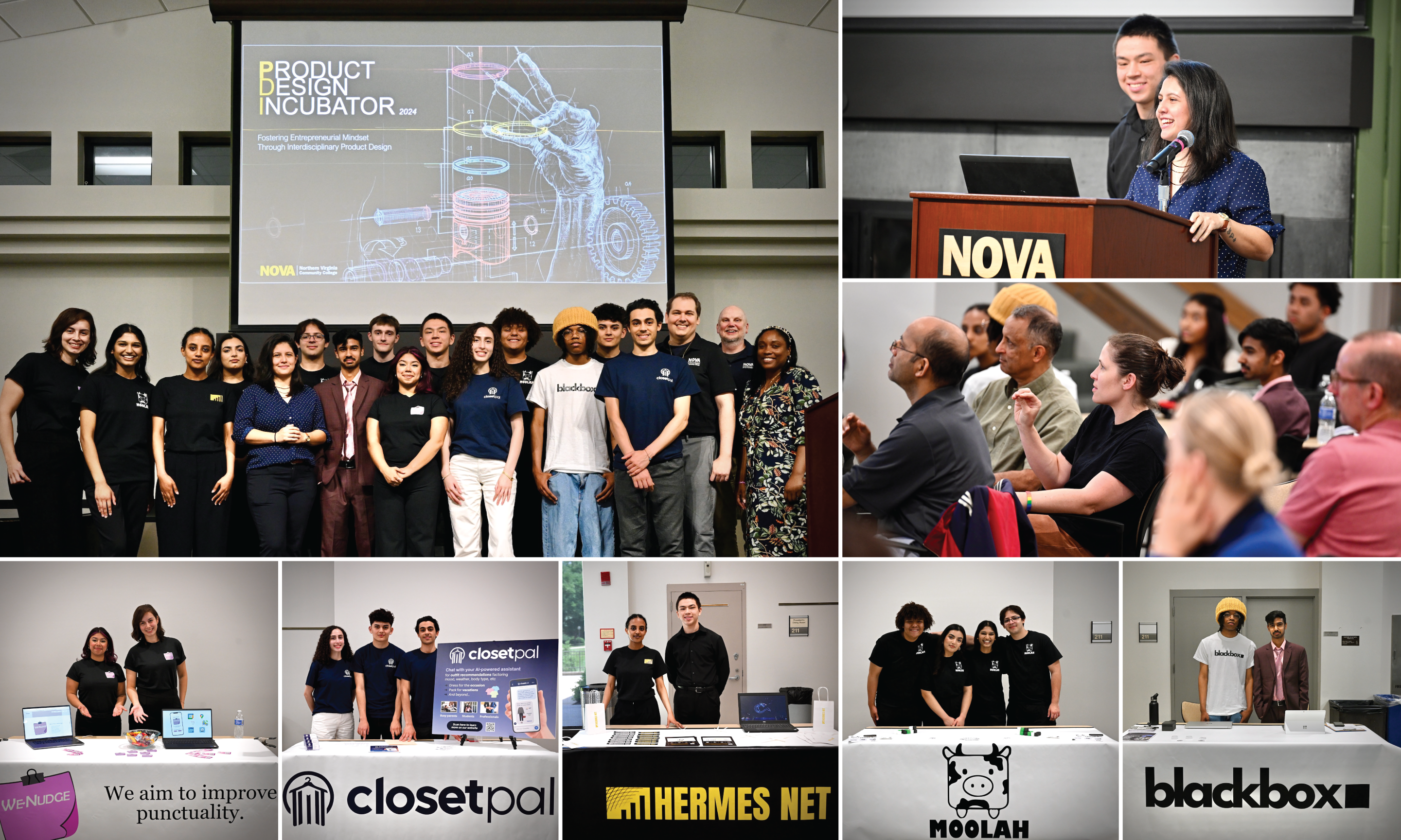On June 14, the NOVA Fab Lab held a Product Design Incubator (PDI) Pitch Event at the Richard J. Ernst Community Cultural Center at the NOVA Annandale Campus.
Sixteen PDI fellows showcased their innovative product design ideas aimed at improving disaster readiness, financial education, closet assistance, timeliness, and cybersecurity.
The presentations were made to an audience that included 12 NOVA professors, four deans, past PDI fellows, and industry guests from Capital One, the Office of Personnel Management (OPM), serial entrepreneurs from new startups, GDIT, Microsoft, and Amazon.
PDI, funded by the National Science Foundation, took place at NOVA’s Manassas campus and aimed to equip students with interdisciplinary product design skills. It was created in response to industry partners’ demand for candidates proficient in collaboration, communication, problem-solving, critical thinking, creativity, and innovation.
Throughout the spring, students participated in entrepreneurship workshops, working in interdisciplinary groups to brainstorm, collect data, and develop solutions. Over the summer, they transformed their concepts into tangible products, creating marketing materials, pitches, and prototypes.
Richard Sewell, Fab Lab Coordinator, led the program, with IET Project Manager Chris Russell and Associate Professor of Business Administration Cameisha Chin serving as co-leads.
Cameisha shared, “Students engaged in meaningful collaborative efforts during the program. At times, they mitigated difficult decisions, mediated differences, and worked to achieve their goals on a timeline. They produced outcomes that were meaningful to each member of their group based on the ideation methodology.”
Cybersecurity fellow Khan Richardson and Cloud Computing fellow Saugat Dhakal developed “blackbox,” a device that intercepts and monitors wireless signals using Signals Intelligence (SIGINT), which involves collecting and analyzing electronic signals and communication-related information.
Both students praised the program, with Khan stating, “We wouldn’t be at this event without the tools and the instructors that the Fab Lab provided us.” Saugat added, “The Fab Lab exposed us to people outside of our majors, and we learned how to use the UV and 3D printers, which made us more confident.”
Judy Marouf, Mohamed Aziz Laouiti, and Jonathan Bonilla created “closetpal,” a personal style assistance app that helps users plan outfits based on the weather, mood, and destination. Users can upload photos of their clothes, and over time, the app will get to know their style preferences better.
Mohamed explained, “I enjoyed working in a team and coming up with an idea that wasn’t my own. We were advised not to bring in our own ideas. They wanted us to start from scratch because that way, each team member owns a part of the product.”
Judy shared, “The really cool thing is that during the first two weeks of the program, we learned something new every day—printing, making t-shirts and stickers, and much more. We learned who we are as teammates, too, and that’s something you don’t usually get to do. I was so close to not applying because I was scared, but I’m so glad I did. I’m so grateful for this opportunity.”
Cloud Computing fellow Camila Lemes Goncalves and engineering student Katie Velasco-Nunez designed “We Nudge,” an app that combines a navigation system with digital calendars, providing appointment reminders and traffic updates. Like “closetpal,” over time “We Nudge” will get to know users’ habits better.
Katie explained, “Camila and I were trying to figure out a common problem we had. After Mr. Russell asked several students why they were late, we came up with this idea. I love our project and was motivated to come to the Fab Lab, which I hadn’t known about until my engineering professor brought our class here. Mr. Sewell gave us the whole spiel, which definitely caught my attention.”
“Moolah,” a budgeting app for college students aged 18 to 25, was developed by cybersecurity student Robert Biliter, business and administration student Haritha Pisupati, computer science student Anosha Khairi, and computer engineering student Jaden Todd. A key component is to partner with colleges in order to keep the app free for students.
The team emphasized the supportive environment of the Fab Lab. Jaden said, “It’s a comfortable environment for both science and art students to meet and match up. It allows us to take ideas and turn them into reality.”
Haritha added, “I think it’s the aesthetic and the vibe itself. The environment helps you concentrate. It’s a place where you can meet people who are different from you and learn a lot from them.”
Team “Hermes Net,” consisting of business management student Stephanie Marino, engineering student Helina Semu, engineering and welding student Matthew Manero, and general studies student Kyle Morrison, created an autonomous drone system that uses waypoint technology and cellular repeaters to deploy cellular service over disaster-struck areas.
Helina highlighted the importance of their product, saying, “Imagine you’re in an area that has been struck by a disaster. You can’t call for help, you can’t call your family. Your family’s trying to call you, but they can’t get to you. Imagine the relief it would provide to know that even if something like this happened to you, your calls could get through.”
“It’s an obvious physical need; you need to be able to call for help, but it’s also an emotional need. Even if you’re fine and your family’s fine, just knowing that is important,” added Kyle.
Fab Lab employee Jason Armstrong, who participated in PDI last year, said, “Seeing the pitches was really cool because I recognized all the hard work these students put in. I appreciated it more because I knew how challenging the program was.”
Richard Sewell expressed his admiration for the students’ dedication, saying, “It’s always amazing to see what students come up with and how far they take it when push comes to shove. Their answers showed how much time they spent thinking about logistics.”
The event acknowledged the invaluable contributions of faculty mentors, directors, deans, speakers, and industry partners who provided guidance and feedback to the students throughout the program.

